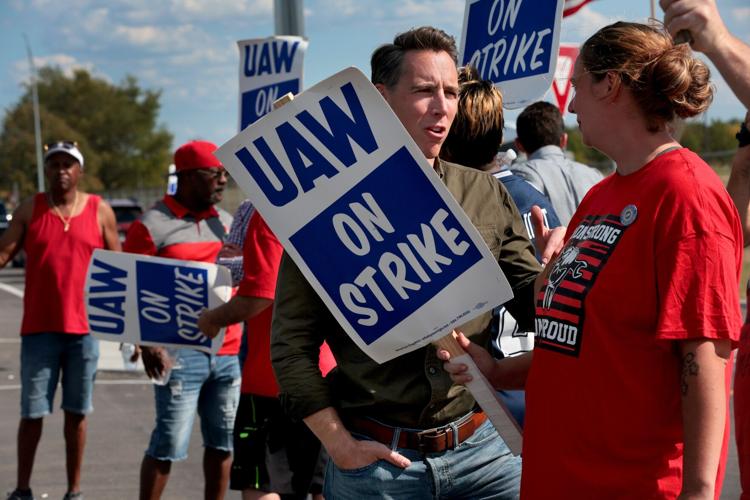
Sen. Josh Hawley thanks supporters as he celebrates victory at a watch party in Ozark, Mo, after he won a second term for U.S. Senate on Tuesday, Nov. 5, 2024.
Like big ships, political parties donât turn around fast. But Josh Hawley seems willing to grab the wheel.
Hawley, Missouriâs senior U.S. senator, readily confirms he wants to change some fundamental aspects of his Republican Party â changes he believes are both strategically sound and long overdue.
Those changes are connected to policies that affect rural and blue-collar workers, the âeverymanâ voting pool that for decades has been the province of the Democratic Party.
In an interview Saturday at the annual Lincoln Days gathering of Missouri GOP faithful, held this year at Westport Plaza, Hawley pointed out the cold fact that those voters now tend to pick Republicans at the poll.
Hawleyâs most recent foray into populist-flavored legislation is his opposition to cuts in Medicaid, which in years past usually set GOP leaders off onto lectures about waste and fraud.
People are also reading…
âIâm not going to vote for Medicaid benefit cuts,â Hawley stated flatly on Saturday, placing himself on the same side of the issue as the reliably liberal Planned Parenthood organization.
That statement was even stronger than one he made just a week before , when he said he stands against cuts proposed in the Medicaid budget by the U.S. House.
âI would not do severe cuts to Medicaid,â he stated then.
While stressing that he favors work qualifications for some Medicaid recipients, Hawley said the GOP has to be careful in sucking funds from Medicaid and the Childrenâs Health Insurance Program â programs that benefit about 1.5 million Missourians, or about 25% of the stateâs population.
âWeâve got to deliver for these people,â Hawley said, noting that it is not only the politically savvy move, âitâs also the right thing to do.â
But even more so than in health care, Hawley has been running under full steam in trying to get the GOP to sail with organized labor â yes, actual labor unions.
In less than two years, Hawley has made moves that have been decidedly opposite of the standard Republican approach.
Not only did Hawley provide many with their first-ever glimpse of a GOP U.S. senator walking a picket line, which he did at the United Auto Workers strike in Wentzville in September 2023, he also managed to get a contribution from the International Brotherhood of Teamsters.

U.S. Sen. Josh Hawley, R-Mo., talks with Kara Cunningham of Troy, Mo., as the senator visited with striking United Auto Workers on the picket lines Monday, Sept. 25, 2023, outside the General Motors truck plant in Wentzville.
Hawley pointed out that while union leadership still leans heavily toward endorsing Democratic candidates, âmore and more union membersâ are voting Republican, a trend that began during President Ronald Reaganâs administration in the 1980s.
Hawley said Republicans, even with 40-plus years of opportunities, have to do a better job of taking advantage of the shift in blue-collar voting.
âWe need to get wages up and we need to get jobs back, and we canât do that without organized labor,â Hawley said Saturday, when asked about his newfound union labeling.
âLetâs face it, unless corporations are held accountable by the American workforce, theyâll never change,â he said, sounding more like a union organizer than a son of a banker.
Then Hawley noted that he recently met with UAW president Shawn Fain to discuss tariffs on the American auto industry, specifically how they give Mexico an advantage in manufacturing.
âAnd he called me for the meeting,â Hawley said with satisfaction, and possibly even pride.
Hawley also has gained public support from Teamsters President Sean OâBrien, who at the Republican National Convention in July praised Hawley for his âpointed questioning of corporate talking heads, lawyers, CEOs and apologists.â
Add to all that the fact that Hawley also has proposed legislation that would benefit union workers by negotiations, barring some work-speed quotas, and adding sick days to railroad workersâ benefits.
Also, along the lines of populist appeal, Hawley wants to cap interest rates on credit cards, , allocate more money for police education and mental health care for first responders, and restrict stock trading by members of Congress.
In those efforts, Hawley has teamed with the liberal likes of U.S. Sens. Bernie Sanders, Elizabeth Warren, Cory Booker and Kirsten Gillibrand; and fellow Missourian, U.S. Rep. Emanuel Cleaver.
These positions aligned with wage-earners have support on the highest level, Hawley said, noting that when it comes to helping working-class Americans, âDonald Trump shares all of these goals.â
To be sure, all this talk of uniting workers has prompted critics of Hawley to bring up his past legislative history.
Before joining the Senate in 2019, Hawley indicated support for a âright to workâ law that would have allowed Missouri workers to reap the benefits of a union-negotiated contract without paying union dues. He also opposed a statewide minimum wage hike.
Those two issues alone provide ample ammunition to take shots at Hawleyâs dedication to working-class concerns.
But Hawley said he understands the leery outlook. âI donât begrudge them that. After all Missouri is the Show Me State,â he said.
So, for his part, Hawley said, he will continue to back labor-friendly legislation and hope that voters, and the Republican Party, pay attention.
âAfter all,â he said, âthe proof is in the pudding.â
Post-Dispatch photographers capture hundreds of images each week; here's a glimpse at the week of March 2, 2025. Video edited by Jenna Jones.











